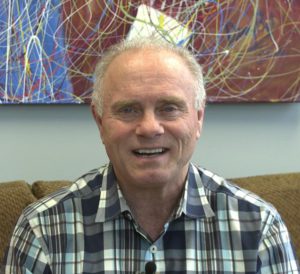Shadows & Light: How to Own Your Dark Side…and Be Free of It
Guest Post by Bill Harris (1950-2018), founder, Centerpointe Research Institute

Bill Harris
In working with hundreds of thousands of people over several decades, I’ve found that nearly all human unhappiness is connected to one thing:
Shadows.
Shadows, in this context, are disowned or repressed human qualities. If a certain area of your life isn’t working, you can be sure that there is a shadow part involved.
Becoming aware of your particular “shadows” – how and why they cause you to think, feel and act – is a major key to living a happier, emotionally peaceful, and successful life.
The Problem with Repressing Parts of Yourself
We all repress or disown normal human qualities that we think are wrong or inappropriate. Many of the difficulties we have in life are the result of these disowned parts which many psychologists refer to as shadows.
When repressed, these shadow parts come out in immature and dysfunctional ways. By repressing them, we actually end up creating, attracting, or expressing more of them.
In every society, there is social agreement about which aspects of us are “wrong” or “bad”. There is, of course, variation from family to family. What one family sees as “wrong” might be okay in another family.
Excellence might be a positive quality in one family, while in another the child who excels might be told, “Who do you think you are? Do you think you’re better than other people?”
Whatever our family’s values, we received negative reinforcement when we exhibited certain qualities and positive reinforcement when we exhibited others.
The Basement of Your Consciousness
We learn that it isn’t safe to express what our family or our culture consider to be negative qualities. To keep ourselves from expressing them, we disowned them, which means that we pushed them into the basement of our consciousness, out of our awareness.
We don’t ever really get rid of these repressed shadow parts. They leak out anyway, appearing in our life in covert and dysfunctional ways.
Let’s say that, for you, anger is a bad thing. Because it’s bad, you resist it in others, and you resist it in yourself. However, like a balloon, which when squeezed in one place pops out in another the anger expresses itself, in one way or another.
Perhaps you’ve made anger wrong or bad because your father’s anger was painful for you when you were small. It also wasn’t safe to show your own anger toward him. He was bigger and stronger and he didn’t like it when you disagreed with him. So you repressed your anger.
You also decided to avoid angry people. After all, you don’t like them. And they scare you.
Ironically, when you disown anger in this way it becomes a central feature of your life. You see angry people everywhere. And, when you encounter an angry person you’re strongly (and negatively) affected by him or her.

Angry people really bother you, even if you aren’t the one they’re angry with. You’re afraid of them and you’re angry about them.
A person with no anger-related trauma, however, and who therefore has not disowned his or her anger, sees the same angry people—after all, they aren’t invisible but isn’t triggered by them in the same way you are.
For you, though, life seems to be a constant stream of angry people. How do all these angry people find you? By disowning your own anger, your attention is drawn to the angry people and you’re less likely to notice or be attracted to people who aren’t angry.
Because your father’s anger traumatised you, you’re on the lookout for it, so you can avoid it.
The Problem with Focusing on What You Don’t Want
As I’ve said many times, focusing on what you don’t want actually causes you to create or attract more of it. So, even though it’s the last thing you want, you attract angry people. And, when you encounter them you’re powerfully affected by their anger.
Everyone can plainly see that you have a lot of anger – everyone but you. You, however, don’t acknowledge – or even realise – that you’re angry.
You’ve disowned it. It’s a shadow.
For you, it’s out there, in others. You don’t see it in yourself. You’re against anger, because it’s such a bad thing.
Ironically, even though you’re against anger, you often express your disowned anger to others in covert and dysfunctional ways. See if any of these behaviour patterns apply to you:
- You fail to do what you say you’ll do (because you really didn’t want to do it)
- You’re late for things you really didn’t want to do
- You make cutting jokes about others
- You become sullen or stubborn
- You’re conveniently forgetful
- You avoid responsibility
- You make excuses
- You complain a lot
- You blame others
- You use sarcasm
…and so on.
In one way or another, your disowned anger is expressed.
In other words, you’re passive-aggressive. You express your anger, but not directly. You can’t express it directly because you’ve disowned it. It’s still there, though. And, in addition to being unpleasant for others, you suffer, too.
Your own disowned anger eats at you.
Of course, anger isn’t the only thing you could disown and repress. I’ve just been using anger as a common example.
You could also disown fear, or selfishness, or thousands of other qualities. You’ll likely disown anything your parents or other authority figures didn’t want you to express:
Wanting, happiness, sexuality, joy, sadness, aggression, pride, intelligence, the urge to be noticed, neediness, being good at things, feeling like a victim or thousands of other human feelings and urges.
A positive quality can also be a shadow. When you see a negative quality you’ve disowned, it triggers you in a negative way. When you see a positive quality you’ve disowned – for instance, charisma, kindness, leadership, talent, or intelligence – you’ll put the person who exhibits it on a pedestal.
You’ll adore or admire that quality in others, but you won’t see it in yourself. You’ve disowned it.
In fact, it’s a general rule that all qualities – disowned or not – exist in all people. And all of them, no matter how positive or negative they seem, are normal human characteristics.
How to Have Choice Over Your Shadow Parts
When you’re unaware of a shadow, you don’t have choice about your emotional reaction to it—you just react. And, you have no choice about how you express that reaction. And, you’ll also attract, unconsciously a constant stream of people who exhibit the shadow aspect you’ve disowned.
When you become aware of a shadow and re-own it, you have choice over it. You move from unconsciously being it to consciously having it.

When you re-own a shadow, what seemed to be a negative quality matures into something positive.
Immature, reactive anger, for instance, might turn into a mature and reasoned unwillingness to tolerate injustice. Narcissistic selfishness matures into mature self-love.
Every shadow has a mature form, and re-owning a shadow allows you to express that quality in a mature and positive way.
Awareness is the Key
Awareness is the key to this transformation. To become more aware of how you’re creating your experience of life is to watch your mind and observe how it works.
Since the internal representations we make lead directly to our feelings, our behaviours, and which people or situations we attract or become attracted to, becoming aware of how we do that gives us choice.
It allows us to stop creating our experience of life automatically, based on the past and, instead, to create our life by choice, in the moment.
You may be tired of hearing me say it, but it’s true: Awareness is the key to transformation. And that’s for one very important reason:
Awareness creates choice.
To become more aware of how you’re creating your experience of life is to watch your mind and observe how it works.
Nowhere is this more true than when dealing with your shadows. Once you become aware of your shadows, and all the ways in which they are affecting your life, you then are granted a kind of superpower over them.
You get to choose to turn them from an enemy into an ally.
With enough awareness, even those dark shadows can be transformed from being obstacles to becoming tools that help us mould and shape the life we deserve and want to live.
That’s right, your shadows-once owned and matured-can help you become happy and healthy.
So don’t live in fear of your shadows. Notice them. Listen to them. Own them.
And as your awareness of them increases you’ll find that even the darkest of shadows can be transformed into a tool we can use to become happier than we ever could have imagined.
It’s your life, shadows and all. What will you choose to do with it?
About Centerpointe Research Institute
 Centerpointe Research Institute was founded by the late Bill Harris in 1989. The Institute produces as it’s flagship a product called ‘Holosync®,’ an audio program formulated to recreate the brain wave patterns of experienced meditators. If you use this program daily, you can achieve the same results in 8 times the time it takes for traditional meditation.
Centerpointe Research Institute was founded by the late Bill Harris in 1989. The Institute produces as it’s flagship a product called ‘Holosync®,’ an audio program formulated to recreate the brain wave patterns of experienced meditators. If you use this program daily, you can achieve the same results in 8 times the time it takes for traditional meditation.
If you would like to get a free e-book called ‘The New Science Of Super Awareness’ by Bill Harris, please visit this web site.
When you sign up, you will also be able to get the audiobook version for free, as well as a free demo of Holosync®.
